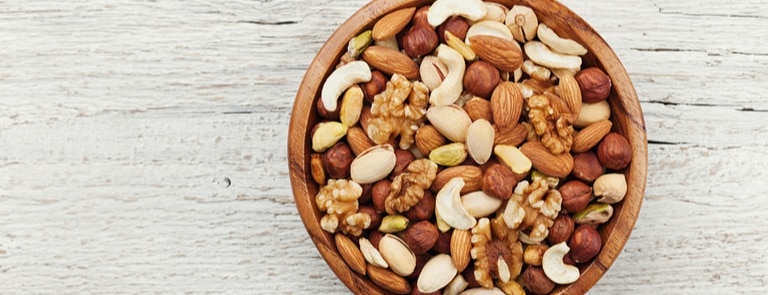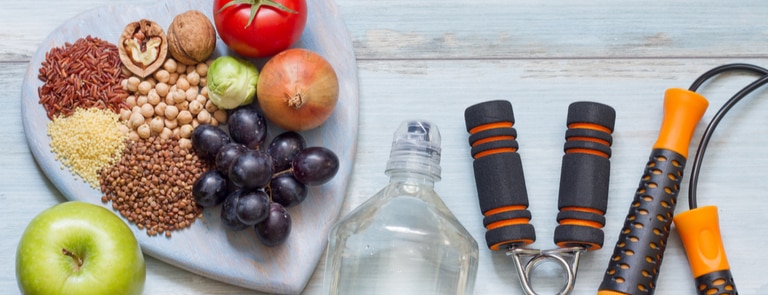10% off £35
Benefits of co-enzyme Q10

Co-enzyme Q10 (co-Q10) is a compound found in every cell in the body, and in particularly high concentrations in the heart, liver and lungs.1
What is co-enzyme Q10 and what does it do?
Co-enzyme Q10 is found in one part of the cell called the mitochondria, often dubbed the ‘powerhouse’ because it helps break down food into energy for the body to use.2
Our co-Q10 levels naturally fall as we get older and it’s also been found to be lower in people with certain conditions, such as heart disease.3
We manufacture most co-Q10 in our liver but it’s also found in small quantities in a wide range of foods.4,5
What does co-enzyme Q10 do in the body?
Co-Q10 is involved in the production of adenosine triphosphate (ATP), an enzyme that provides energy for all the vital processes happening within our body’s cells.6
The heart, liver, lungs, kidneys and skeletal muscles all have high levels of co-Q10, because they’re organs and tissues that need a lot of energy.7
Some studies suggest that co-Q10 may help protect our cells from free-radical damage (oxidation), but more research is needed to confirm these results.8,9
How does coenzyme Q10 work?
Coenzyme Q10 is often in skincare products such as toners, gels, and creams. But what does coenzyme Q10 do for the skin?
-
Invigorates cell activity
This extra energy helps contributes to maintaining healthy skin cells.
In short, it helps your skin perform its functions as efficiently as possible.
-
Supports collagen and elastin production
Collagen keeps your complexion firm and plump. Elastin gives your skin elasticity.
Together they provide skin with strength and structure. By spurring on cell activity, coenzyme Q10 helps maintain a healthy supply of new collagen and elastin.
-
Helps fight off free radicals
Free radicals attack elastin and collagen causing them to lose shape.
As an antioxidant, coenzyme Q10 helps to shield your skin cells from this oxidative stress and allows toxins to be flushed out more efficiently.
This limits the harm they cause and aids the healing of any damage.
What are the potential benefits of co-enzyme Q10?
So now you know what co-Q10 does in the body, what are its specific health benefits?
-
Support heart health
A major review of evidence in 2007 concluded that co-Q10 could help maintain normal blood pressure ‘without significant side effects’.10
If you’re on medication for high blood pressure (or any other medication), talk to your GP before taking co-Q10.
-
Reduce the signs of ageing
Co-Q10 could also help protect skin from the signs of ageing, such as wrinkles and loss of elasticity.
A 2017 Japanese study found that people taking 30mg of co-Q10 every day for six weeks had ‘significantly improved’ wrinkles and better skin texture.11
-
Radiance
As you age, adding CoQ10 to your skincare routine enables skin cells to repair and regenerate more efficiently.
As a result, a dull and tired complexion can get a radiance boost.
-
Firming
Due to healthy production of new collagen, your skin appears firmer and the appearance of fine lines and wrinkles can also reduce.
-
More even skin tone
Excess production of melanin can cause dark spots and patches of hyperpigmentation to form.
CoQ10 has been reported to inhibit the production of tyrosinase – a substance that facilitates the production of melanin.
As a result, coenzyme Q10 skincare can limit the worsening of these changes in skin tone.
-
Skin-soothing
As an antioxidant, CoQ10 helps to shield your skin from irritants and damage from external factors.
-
Co-Q10 and Alzheimer’s disease
Some studies indicate a link between co-Q10 and dementia.
One trial by scientists in New York found that treatment with co-Q10 could reduce levels of oxidative stress – which plays a role in Alzheimer’s – on brain cells, while the University of Maryland Medical Centre says co-Q10 may improve oxygen flow to the brain.12,13
Oxygen deprivation is linked to some types of dementia, including Alzheimer’s disease.14
How much co-enzyme Q10 do I need?
Because co-Q10 is neither a vitamin nor a mineral, there’s no official reference nutrient intake (RNI).
Supplements can range from 50mg to 200mg, while we tend to consume 3–5mg through our daily diet.15
Do children need co-enzyme Q10?
Levels of co-Q10 decrease as we get older, so children naturally have higher levels than adults.16
Should women take a co-enzyme Q10 supplement during pregnancy?
Co-Q10 hasn’t been tested for safety during pregnancy and breastfeeding, so it’s best avoided.17
Which foods are the best sources of co-enzyme Q10?
Co-Q10 is found in many foods. The best animal-based sources include:18
- beef
- herring
- chicken
- rainbow trout
- eggs
The best plant-based sources include:19
- peanuts
- rapeseed oil
- sesame seeds
- pistachios
- broccoli
What are the symptoms of co-enzyme Q10 deficiency?
Levels of co-Q10 gradually reduce with age, although this isn’t the same as a deficiency. Lower levels are also linked to the use of statins – cholesterol-lowering drugs – as well as cardiovascular conditions, diabetes, fibromyalgia, and neurodegenerative disorders such as Parkinson’s disease.20
It’s not clear whether low levels of co-Q10 are a result of, or the trigger for, these conditions.21
Vegetarians or vegans may also have low levels of co-Q10 as the richest sources are mainly meat, fish and poultry.22
A true co-Q10 deficiency is incredibly rare and most likely caused by genetic problems that mean the body cannot produce the proteins needed to help process co-enzyme Q10.23
What happens if I consume too much co-enzyme Q10?
No serious side effects of co-Q10 have been reported, but mild side effects include insomnia and digestive problems.
If you’re taking blood-thinning medication such as warfarin or insulin for diabetes, it’s best avoided.24
When should I take co-enzyme Q10 supplements?
It’s still not clear exactly who would benefit from taking a co-Q10 supplement, but you could choose to as part of a healthy lifestyle.
Research shows it may also help the appearance of wrinkles.25
If you are vegetarian, vegan or don’t eat a lot of meat, you could also consider a supplement.
There are two types of co-Q10 supplements – ubiquinone and ubiquinol.
Your body is most able to absorb the ubiquinol form. As it’s fat-soluble, your body is able to absorb it up to three times faster if you take it with food.26
- https://www.healthline.com/nutrition/coenzyme-q10/
- https://www.healthline.com/nutrition/coenzyme-q10/
- https://www.ncbi.nlm.nih.gov/pubmed/24389208
- https://patient.info/doctor/coenzyme-q10#ref-1
- https://www.healthline.com/nutrition/coenzyme-q10/
- https://www.news-medical.net/life-sciences/Adenosine-Triphosphate-(ATP)-Function-in-Cells.aspx
- https://www.healthline.com/nutrition/coenzyme-q10/
- https://patient.info/doctor/coenzyme-q10#ref-1
- https://www.ncbi.nlm.nih.gov/pubmed/16873950?dopt=Abstract
- https://www.nature.com/articles/1002138
- https://www.oatext.com/Coenzyme-Q10-gamma-cyclodextrin-complex-is-a-powerful-
- https://www.ncbi.nlm.nih.gov/pubmed/21799249
- http://www.umm.edu/health/medical/altmed/condition/dementia
- https://www.dementia.org/oxygen-deprivation-dementia
- https://www.ncbi.nlm.nih.gov/pubmed/9266531
- https://www.mayoclinic.org/drugs-supplements-coenzyme-q10/art-20362602
- https://www.mayoclinic.org/drugs-supplements-coenzyme-q10/art-20362602
- https://lpi.oregonstate.edu/mic/dietary-factors/coenzyme-Q10#food-sources
- https://lpi.oregonstate.edu/mic/dietary-factors/coenzyme-Q10#food-sources
- https://www.ncbi.nlm.nih.gov/pubmed/24389208
- https://www.healthline.com/nutrition/coenzyme-q10/
- https://lpi.oregonstate.edu/mic/dietary-factors/coenzyme-Q10#food-sources
- https://ghr.nlm.nih.gov/condition/primary-coenzyme-q10-deficiency
- https://nccih.nih.gov/health/coq10
- https://www.ncbi.nlm.nih.gov/pubmed/15728298
- https://www.healthline.com/nutrition/coenzyme-q10/














